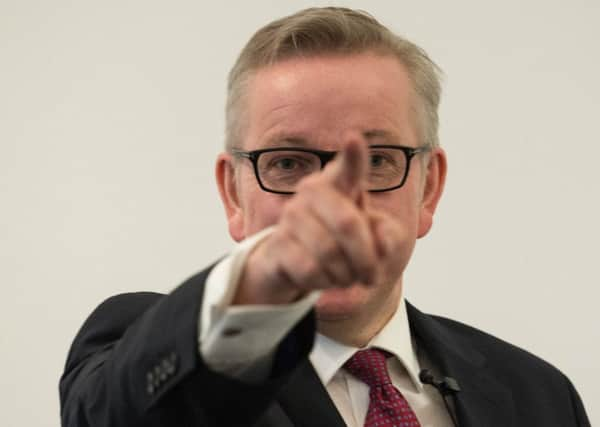Can Michael Gove deliver for NI agriculture?


He went on to be president of the European parliament and only retired from the House of Lords last November at the age of 92. Once, when interviewing him about policy in my BBC days, he said that farmers in Northern Ireland would understand the meaning of the phrase that ‘talk is cheap, but it takes money to buy drink’.
That sums up what we are now hearing about the future of farm support. With Michael Gove at the NFU annual meeting this week we had another example of talk with no certainty of there being money attached. For now Gove deserves the chance to prove that he can deliver a post-Brexit deal that will benefit farming. His performance was typically assured, as would be expected from someone with his political skills. But there is always a sense that he is trying to be all things to all people. However with the government due to publish its final agricultural proposals soon, we will get to see whether Gove can turn talk into drink, to paraphrase Henry Plumb.
Advertisement
Advertisement
What is becoming clear now is that there will not be the expected gulf between the CAP in the EU-27 and the support measures for the UK. This is assuming that Michael Gove can deliver on the sort of things he has been saying, and more importantly on the generosity of the Treasury when it comes to a long term commitment to continue funding agriculture to the tune of around £3 billion a year. That generosity probably has more of a question mark over it than whether or not a green Brexit plan will be the centrepiece of plans for an effective CAP replacement.
In Brussels farm ministers have achieved a reasonable level of common cause on the way ahead for the CAP. They are agreed on the need for a policy that targets funds to ‘genuine farmers’, which seems to be Brussels speak for cutting back or eliminating aid to large landowners. This suggests that 20 years after they were suggested in MacSharry CAP reforms degressivity policies could finally emerge. This would be in line with what Gove is suggesting for the UK. This is ironic, given that it was the Conservative government and the then farm minister, John Gummer, that battled to prevent the Commission introducing these policies in the 1990s.
Other priorities include additional aid for young farmers, which may not be on the Gove agenda, and the linking of payments to the delivery of ‘public goods’ which is completely in line with Gove’s thinking. On rural development EU farm ministers want a simpler, less bureaucratic policy, which will be welcome. This is an area not yet touched on by the government. The UK will have to come up with a workable policy or accept the demise of many rural development schemes that depend on EU funding.
As to the Gove speech at the NFU meeting, farmers will have welcomed his promise to review the inspection regime for farm payments. This was, after all, why many voted to leave the EU. However it is not clear whether this can be more than a review. As long as CAP structures are being implemented after Brexit inspections will be part of that process. Beyond that the green Brexit plans Gove is promising, linking payments to the delivery of ‘public good’ and environmental gains, is a far from a red tape free approach. Indeed it is arguably potentially more bureaucratic than single payments, since farmers will have to prove they are delivering the green outcomes about which Gove is making so much. We may well see a review of inspections, but a review does not guarantee that the new UK approach will be any more streamlined than what has come from Brussels. He also promised to reward farmers for high animal welfare standards – a deeply patronising remark for an industry that delivers those every day, and a comment targeted not at farmers but at the wider public. Strip all this away and with the UK and EU-27 set to go down largely similar roads the key question is whether Brussels or London will deliver the better outcome for farmers with the least red tape.
Answers on a postcard, please.....